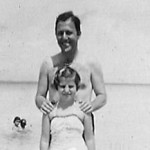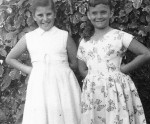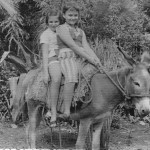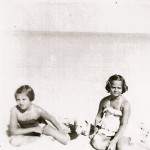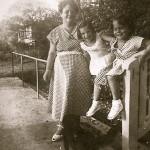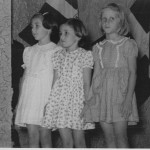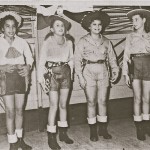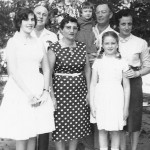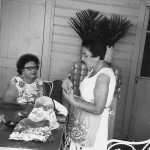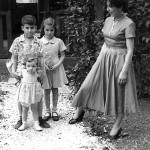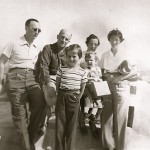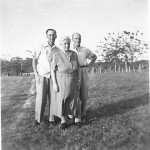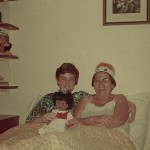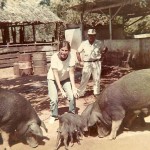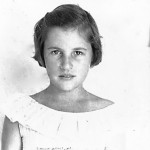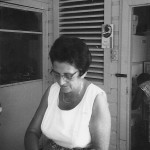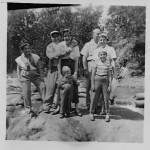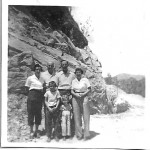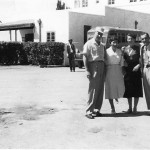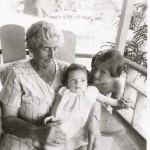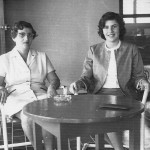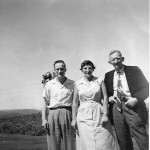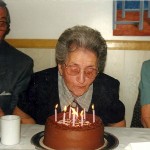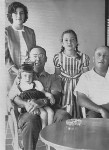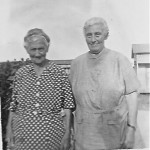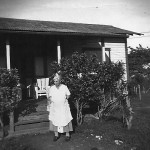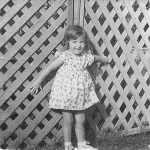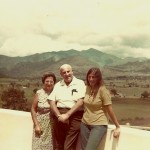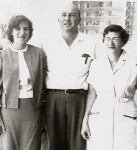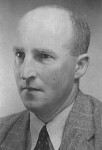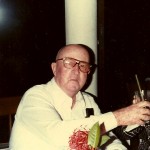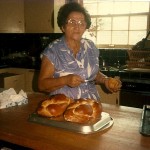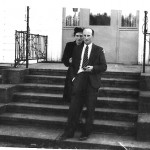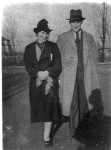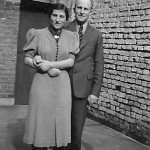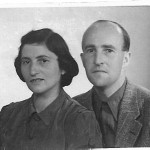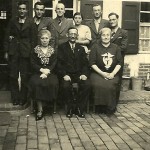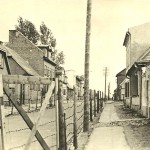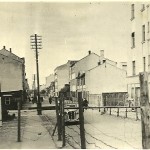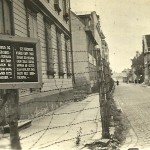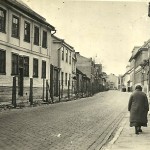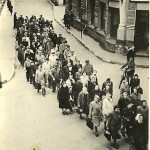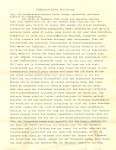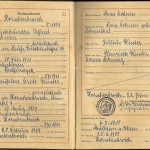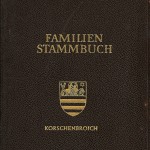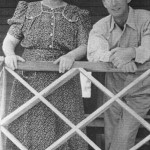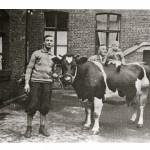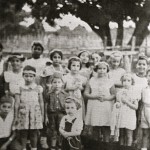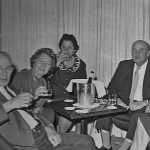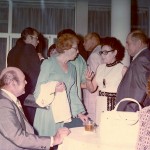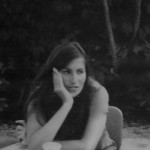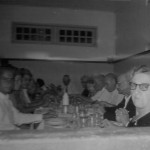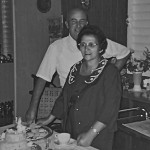| Alfred Cohnen: | Born in Aldenhoven, Germany July 18, 1911 Deceased in Sosúa September 11, 1995 |
| Grete Cohnen nee Winter: | Born in Korchenbroich, Germany March 19, 1909 Deceased in Los Angeles, US August 8, 2008 |
Children: Ruth
Grandchildren: Eric, Marissa, Max
FAMILY STORY:
Alfred was born in a small town in Germany where his father was a cattle dealer, one of the few jobs available to Jews at that time. By the time he was 16 years old he was working full time with his father, whose health had seriously deteriorated. He had one brother, Paul, younger by six years, who was still in school.
My father’s favorite things, along with children, were cows. He could look at a cow, guess its weight to within a few kilos, know how many calves it had, and so on. He had an incredible eye for cattle, and this was his life-long passion. He also loved puzzles of all kinds, and loved to play cards, especially “zenser,” a card game based on the French card game Belote. Alfred was also incredibly quick mentally, and loved making jokes, especially ribald ones. He also liked to take songs, rewrite them and make them very funny, and he loved teaching them to Ruth and his nieces Eva and Jeany (Paul’s daughters).
Grete was the serious one of the couple. She also grew up in a small town in Germany, the oldest of six siblings and the only girl. She had to help run her household at a very early age, as her mother died when she was barely 16 years old and her youngest brother was only 3 years old at that time. Her father was also involved in the cattle business, but was also very active in the synagogue as a “vorbeter,” a type of deacon. They kept a kosher household, and my mother knew a great deal about prayers and the Jewish way of life. She went to school and studied to become a secretary. However, she eventually had to leave her position because of Hitler, and went to work as a maid in Alfred’s household. This is where they met, fell in love and eventually married. Grete also loved puzzles of all kinds, card games, and she also loved to travel and to read. She was also an amazing cook and baker; sadly, this is not one of the traits her daughter inherited. Grete loved sports of all kinds and played many of them while growing up.
Grete and Alfred were supposed to go to Chile around 1940, but by the time they decided to get out of Germany, it was too late to leave. Alfred’s mother Sara and his brother Paul had already left for the Dominican Republic, but sadly they got stuck in Germany, along with all of Grete’s brothers and parents. In 1941 they were sent to the ghetto in Riga, where they spent several years and were saved several times by different strokes of luck. As fate would have it, when they were being selected to go to the different concentration camps, they remained in the ghetto. Grete worked at the harbor loading ships for the army, while Alfred worked in the ghetto. Sadly, Grete’s favorite brother Kurt was also in the ghetto, but he had to work in the Salaspilz killing grounds burying the dead, and he eventually died of gangrene. Grete could never get over losing her favorite brother.
Toward the end of 1944, when the Russian front was moving toward Riga, Alfred was sent to the concentration camp Bergen Belsen. Grete was moved to Lübeck and Hamburg, where she was in prison with her sister-in-law Hilda, Kurt’s widow. Grete was eventually liberated by Count Bernadotte, a Swedish count with the Red Cross, and was sent to Sweden to a relocation camp. Alfred was still in Bergen Belsen, weighing less than100 pounds, dying of typhus. Luckily, he was liberated by the British army under Montgomery’s forces. He then spent months in a hospital run by the British, and eventually, on a fluke, he reconnected with Grete. Neither knew if the other was still alive. After his release from the hospital, Alfred was sent to Sweden as well, and was reunited with Grete. They then went to work in the household of a Swedish landowner, with Alfred working in the garden and Grete in the kitchen. Unexpectedly and a surprise to both, Ruth was born. As Paul and Sara (Alfred and Paul’s mother) were in Sosúa, they decided to emigrate to the Dominican Republic in 1949 to join the family that was still alive.
Alfred adored living in Sosúa, as he was once again among his beloved cows, along with his brother and mother. However, it was something of a culture shock for Grete, who preferred what she called a “more civilized” type of living. Ruth took to Sosúa like a duck to water, and by the time she was four was translating Spanish for her parents. The first couple of years in Sosúa, they lived on the farm in Bombita, but then moved to the Batey to a house on Pedro Clisante Street, right across from the post office. More importantly, it was right across from Paul and Grete (his wife), and her cousin Jeany.
Paul and Alfred were partners in the cattle business their entire lives. They did everything together, including Sabbath dinners. The families were extremely close, and to this day the cousins still treat each other as sisters. They played cards together, traveled to Constanza, the capital, and other places. The families were truly united, and the kids felt they had two sets of parents, a very lucky situation.
Alfred never left Sosúa except to take a few trips. He never wanted to emigrate, and felt he had found home. He is buried in the Sosúa cemetery next to his mother. After Alfred’s death, Grete came to the United States and lived with her daughter and grandchildren for seven years. She died in 2008 in Los Angeles and is buried there. This was her wish.
Although both Grete and Alfred were religious Jews, interestingly they never again fasted on Yom Kippur, as they always said “we fasted enough to last two lifetimes,” referring to their time in the concentration camps. This period of their lives in the camps deeply affected both of them. According to Grete, Alfred became an entirely different person. As they always said, you can’t take experiences off yourself as though you were removing a shirt. Their stories about the Holocaust and their suffering have left an indelible impression on their daughter, difficult at times, but nevertheless a part of their history imprinted on the following generations.
PHOTO GALLERY
- Ernst Weinberg, Ruth
- Fanny Wachsman, Pupi Schwarz, Ruthie
- Ruth and Pupi
- Ruth and Pupi Schwarz
- Ruth, Pupi Schwarz
- Hilde Schwarz, Ruthie, Pupi Schwarz
- Sonja Topf, Ruthie, Hella Floersheim
- School play: Ivette Ratz, Ruthie, Pupi Schwarz, Sonja Topf
- Ruth, Alfred, Grete W, Pablo, Grete H, Jeany
- Ruthie in Purim costume
- Hilde Schwarz and Grete
- Jeany, Ed Kohn, Ruthie, Hermine Kohn
- Ruthie
- Back: Paul. Alfred, Grete H, Grete W. Front: Ruth, Jeany
- Sara Cohnen with sons Pablo and Alfred
- Jeany and Tante Grete
- Ruth, Arturo Kirchheimer
- Ruth
- Grete W
- Ruth, Jeany
- Rothenbergs and Cohnens
- Back row: Grete H, Alfred, Paul, Grete W. Front row: Ruth, Jeany
- Alfredo, Grete, Hermine and Erich Kohn
- Sara, Jeany, Ruth Cohnen
- Ruth and Scott wedding: Alfred, Ruth, Scott Kruse, Grete
- Grete, Ruthie
- Alfred Winter, Grete W, Julius Winter
- Grete’s 90th birthday
- Ruth, Jeany, Alfred, and Paul with baby Eva
- Sophie Weinberg, Sarah Cohnen
- Sara Cohnen in Bombita
- Ruth
- Grete, Alfred, Ruthie
- Ruth, Alfred, Grete
- Sara Cohnen
- Alfred
- Alfred
- Grete getting ready for Sabbat
- Grete and Alfred in Germany
- Grete, Alfred
- Grete, Alfred in Germany
- Grete, Alfred
- Standing: Herbert and Kurt Winter, Alfred Cohnen, Grete Winter Cohnen, Paul Cohnen, Alfrred Winter Sitting: Henriette and Julius Winter, Sarah Cohnen
- The entrance to the Latvian women’s ghetto–only approximately 100 women had survived.
- This was called the Prague Gate. Here we had to stand at attention–on the left side beneath the command headquarters. Here they paid the workers as well.
- These signs were hung every few meters around the entire ghetto. The writing stated: Those persons who try to climb over the wire or who attempt to contact people on the outside will be immediately shot.
- View of the front side of the Riga Ghetto, towards the city on Moscow St.
- A column in the middle of Riga that is marching on their way to work. You are able to recognize the Jewish stars on many of the people
- Eidesstattliche erklaerungen 2/2
- Eidesstattliche erklaerungen 1/2
- Family book entry-certificate of marriage
- Family book (Germany)
© Copyright Protected

